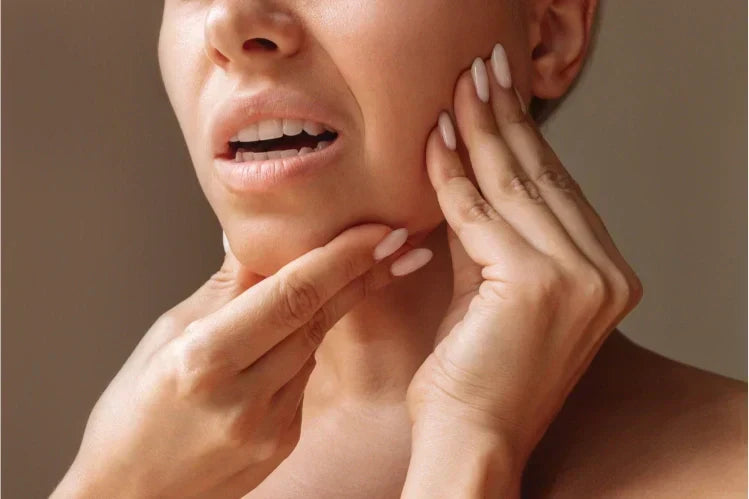
Table of Contents
- Understanding TMJ Disorders and Jaw Clenching
- What Are Mouth Guards?
- How Do Mouth Guards Reduce Jaw Pain?
- Types of Mouth Guards: Which One is Right for You?
- Jaw Clenching Solutions
- Clinical Insights and Research
- Introducing ALIGNERCO Night Guard for Relieving Jaw Pain
- How to Obtain Your Mouth Guards?
- Why Choose ALIGNERCO?
- Customer Testimonials
- A Simple Step toward Lasting Jaw Pain Relief
- FAQs
Jaw pain is a widespread but frequently underestimated health concern that impacts millions of people around the globe. However, in cases of chronic pain or more complex conditions like TMJ (temporomandibular joint) disorder, it can significantly disrupt daily life. Mouth guards for jaw pain have become one of the most recommended solutions. But how effective are they?
This blog delves into how mouth guards in jaw pain management work, the science behind their effectiveness, and highlights their role as a primary defense against TMJ disorders, jaw clenching, and related conditions.
Understanding TMJ Disorders and Jaw Clenching
The temporomandibular joint (TMJ) connects your lower jaw (mandible) to your skull near the ears. This joint is especially prone to stress caused by habits like chronic jaw clenching or grinding, also known as bruxism. These behaviors strain muscles, teeth, and joint structures, common triggers for jaw pain, headaches, and limited jaw movement.
A recent study found that about 11-12 million adults in the United States had pain in the region of the temporomandibular joint. With time, this constant strain can cause muscle fatigue, erode tooth enamel, and inflame the jaw joint—clear indicators that treatment is necessary.
What Are Mouth Guards?

Also known as night guards, dental guards, or splints, mouth guards are dental devices typically made from soft or rigid plastic. They are custom-designed to fit your upper or lower teeth and serve as a cushion, creating a protective barrier that reduces the effects of grinding or clenching. The guard helps your jaw muscles relax and protects your teeth from damage.
Types of Mouth Guards
- Stock or Boil-and-Bite Guards: Over-the-counter and affordable, molded at home.
- Custom-Fitted Night Guards: Created from dental impressions, night guards for jaw tension offer a precise fit and are crafted by professionals.
- Stabilization Splints: These flat guards help ensure even contact and promote muscle relaxation.
- Repositioning Splints: These shift the jaw into a better alignment to reduce strain.
How Do Mouth Guards Reduce Jaw Pain?
1. Reducing Muscle Tension
Mouth guards prevent the teeth from coming into direct contact, reducing the force exerted by the jaw muscles. This helps lower muscle strain and offers relief from clenching-related pain.
2. Alleviating TMJ Disorder Symptoms
TMJ disorder relief often includes reducing inflammation, allowing the joint to rest, and realigning the bite. A properly designed mouth guard for TMJ pain can lessen pressure on the joint and allow healing over time.
3. Preventing Tooth Damage
Grinding wears down tooth enamel, making teeth more prone to sensitivity, fractures, and even gum issues. Mouth guards act as a shock absorber, preventing further damage.
4. Improving Sleep Quality
Bruxism often interrupts restful sleep. Wearing a guard can reduce nighttime clenching and grinding, helping you sleep better and feel refreshed.
Types of Mouth Guards: Which One is Right for You?
| Type | Best For | Features |
|---|---|---|
| Stock Mouth Guards | Temporary use | Inexpensive, bulky, non-custom |
| Boil-and-Bite | Short-term relief | Custom-fit with hot water molding |
| Custom Dental Guards | Long-term use | Professionally made, custom-fit, more effective |
A dental guard for jaw clenching that's custom-made is typically more effective for long-term relief, especially for individuals with complex or severe symptoms.
Jaw Clenching Solutions
While mouth guards are highly effective, a holistic approach can improve results:
Physical Therapy
Strengthens and relaxes jaw muscles with targeted exercises.
Stress Management
Mindfulness, deep breathing, and yoga can help relieve stress-related clenching.
Medications
Muscle relaxants, anti-inflammatory drugs, or even Botox injections may be prescribed for severe cases.
Diet Adjustments
Avoid chewy foods or gum and switch to softer foods during painful periods.
Clinical Insights and Research
Several studies support the use of mouth guards for TMJ and bruxism:
- A 2021 systematic review in Sentinel Mouthguards mentions a JOR review concluding that night guards significantly reduce pain and improve jaw function.
- The American Dental Association also advises using occlusal guards for individuals who consistently grind their teeth.
Introducing ALIGNERCO Night Guard for Relieving Jaw Pain

ALIGNERCO Night Guard for jaw pain offers a comfortable, custom-fit solution to relieve jaw tension, reduce teeth grinding, and ease TMJ-related discomfort. Made from high-quality, durable material, it cushions the jaw and promotes muscle relaxation during sleep. Ideal for those dealing with bruxism or TMJ symptoms, ALIGNERCO’s Night guard provides effective relief without the need for invasive treatments—all from the comfort of your home.
Here is what an ALIGNERCO Night Guard offers:
- 2mm thickness
- Customized fit
- Impact resistance
How to Obtain Your Mouth Guards?
Order and Create Your Impression
Take a step to protect your smile. Order the ALIGNERCO mouth guard online and get our impression kit at your doorstep.
Create Impressions
Our impression kit includes all the necessities to craft perfect impressions. Follow the instructions and make your impressions carefully. Once done, send us the impressions so we can start working on your custom mouth guard.
Receive Your Mouth Guard
Upon receiving your impressions, we will create a mouth guard customized to your dental structure and deliver it to your doorstep.
Why Choose ALIGNERCO?
- Affordable Pricing: Obtain the best custom mouth guards and dental care services at affordable prices.
- Custom Fit: The custom mouth guards provided by ALIGNERCO are tailored for every user to guarantee comfort and security.
- High-Quality Materials: These mouth guards are constructed with medical-grade and BPA-free materials for enhanced effectiveness and durability.
- Easy Process: When it comes to at-home impressions and aligner fittings, ALIGNERCO makes the treatment process as easy as possible for clients.
- 24/7 Support: Feel free to get help from the dedicated customer support whenever required.
- Effective Results: Our aligners and dental products guarantee the safety, proper alignment, and aesthetics of your smile.
Customer Testimonials
Lena M., New York
"I used to wake up with headaches and a tight jaw. After my dentist recommended a mouth guard, the pain started to fade within weeks. Now I sleep through the night and feel much better in the morning."
Jason R., Los Angeles
"Grinding ruined one of my molars. But ever since I started using a custom mouth guard, no more issues. It's a part of my nightly routine now."
A Simple Step toward Lasting Jaw Pain Relief
Can mouth guards help with jaw pain? Absolutely. Jaw pain caused by clenching, grinding, or TMJ issues can seriously impact your quality of life. Night guards offer a simple, non-invasive way to manage and reduce this pain. They relax your jaw muscles, relieve pressure, and protect your teeth—key elements for lasting relief.
Looking for a trustworthy, affordable option? ALIGNERCO’s Night Guard offers the comfort, protection, and results you need—right from the comfort of home. Start your journey to better sleep and a pain-free jaw today.
FAQs
1. Does wearing a mouth guard help the jawline?
A mouth guard doesn’t change the jawline’s shape but can help relax tense jaw muscles and reduce clenching, which makes the jaw appear less swollen or tight over time.
2. How do I make my jaw stop hurting?
Apply warm compresses, practice jaw stretches, reduce stress, and use a night guard at night to relieve tension from grinding or clenching. Consult a dentist if pain persists.
3. How long does it take for a mouth guard to fix TMJ?
Relief can start within a few days to weeks, but consistent use over several months is often needed for lasting improvement. Results vary based on severity and compliance.
4. How to fix a misaligned jaw?
Mild misalignments may be managed with mouth guards, orthodontic treatment, or physical therapy. Severe cases might require braces or surgical intervention—consult a dental professional for a proper diagnosis.
Citations:
Al-Ani, Z., Gray, R. J. M., Davies, S. J., Sloan, P., & Glenny, A. M. (2004). Occlusal splints for the treatment of temporomandibular joint disorders. Cochrane Database of Systematic Reviews, (1), CD004016. https://doi.org/10.1002/14651858.CD004016.pub2
Clark, G. T., Tsukiyama, D. T., Baba, K., & Watanabe, T. (2008). The role of oral splints in the management of temporomandibular disorders. Journal of the American Dental Association, 139(10), 1242–1251. https://doi.org/10.14219/jada.archive.2008.0040
Lobbezoo, F., & Naeije, M. (2000). A reliability study of clinical tooth wear measurements. Journal of Prosthetic Dentistry, 84(5), 486–490. https://doi.org/10.1067/mpr.2000.110901
Lobbezoo, F., & Naeije, M. (2001). Bruxism is mainly regulated centrally, not peripherally. Journal of Oral Rehabilitation, 28(12), 1085–1091. https://doi.org/10.1046/j.1365-2842.2001.00794.x
Wright, E. F., & Domenech, M. A. (2010). Usefulness of occlusal splints for temporomandibular disorders. Journal of the American Dental Association, 141(9), 1080–1089. https://doi.org/10.14219/jada.archive.2010.0331






